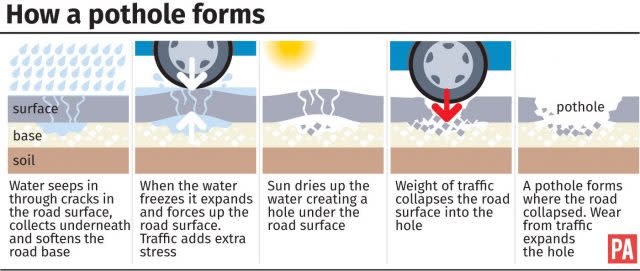Cars could be programmed to chart potholes in future, says Highways England

Cars of the future could be programmed to spot potholes and transmit the information to Highways England, the road operator has said.
Highways England said "connected vehicles" could improve the efficiency of how routes are maintained, while simultaneously improving safety, in a report published on Wednesday.
The company responsible for the operation, maintenance and improvement of the nation's roads said drones could also be deployed to monitor roads and improve response times.

In its Strategic Road Network Initial Report, the government-owned company said technology would play an ever greater role in keeping Britain's roads in shape.
The report will be used to inform the government's next road investment strategy which is due to start in 2020.
Highways England chief executive Jim O'Sullivan said: "We are delivering a record £15 billion of government investment to give people safe, efficient and reliable journeys, and provide businesses with the links they need to prosper and grow.
"Because people's journeys are important to us we are setting out our high level aspirations which will help ensure the network continues to drive economic growth, jobs and prosperity, and keeps traffic moving today, and into the future.
"We encourage people to read our report and feed back through the Department for Transport's (DfT) consultation, which is also launched today."
Cars of the future could be programmed to spot potholes on motorways and automatically transmit the information to @HighwaysEngland to schedule repairshttps://t.co/oWiJGK0nFVpic.twitter.com/nhoLqzSOVo
-- Parking Review (@ParkingReview) December 13, 2017
The DfT's consultation runs until February 7.
Transport Secretary Chris Grayling said: "This government is making people's journeys better, faster and safer to give people better access to jobs, schools and their community.
"We are planning to spend more than ever before to upgrade England's motorways and major A roads from 2020 through to 2025."
(function(i,s,o,g,r,a,m){i['GoogleAnalyticsObject']=r;i[r]=i[r]function(){ (i[r].q=i[r].q[]).push(arguments)},i[r].l=1*new Date();a=s.createElement(o), m=s.getElementsByTagName(o)[0];a.async=1;a.src=g;m.parentNode.insertBefore(a,m) })(window,document,'script','//www.google-analytics.com/analytics.js','ga'); ga('create', 'UA-72310761-1', 'auto', {'name': 'pacontentapi'}); ga('pacontentapi.set', 'referrer', location.origin); ga('pacontentapi.set', 'dimension1', 'By PA Reporters'); ga('pacontentapi.set', 'dimension2', 'f7308cd9-7625-4e18-bdaf-a3459f33bf1a'); ga('pacontentapi.set', 'dimension3', 'paservice:news,paservice:news:uk'); ga('pacontentapi.set', 'dimension6', 'story-enriched'); ga('pacontentapi.set', 'dimension7', 'composite'); ga('pacontentapi.set', 'dimension8', 'paasset:graphic'); ga('pacontentapi.set', 'dimension9', null); ga('pacontentapi.send', 'pageview', { 'location': location.href, 'page': (location.pathname + location.search + location.hash), 'title': 'Cars could be programmed to chart potholes in future, says Highways England'});


